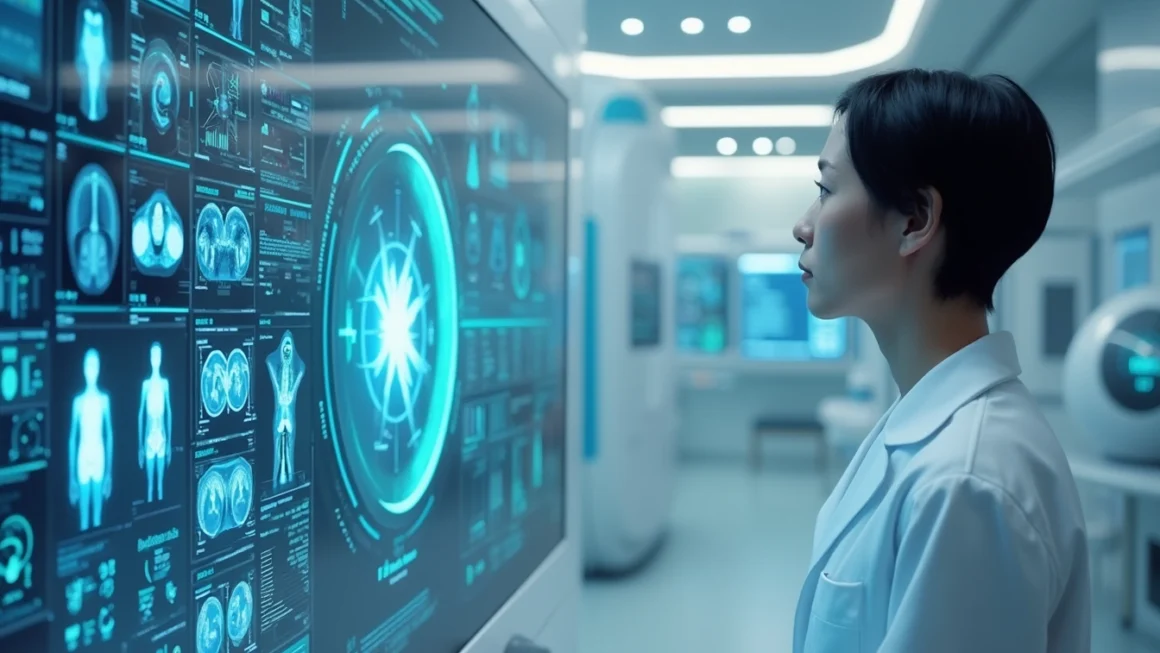The Rise of Artificial Intelligence in Healthcare
Table of Contents
The healthcare industry is on the brink of a major transformation, thanks to the rapid advancements in artificial intelligence (AI). This cutting-edge technology is revolutionizing various aspects of medical care, from diagnosis to treatment planning, and has the potential to significantly improve patient outcomes.
AI-Powered Diagnostics
One of the most promising applications of AI in healthcare is in the field of diagnostics. Machine learning algorithms can analyze vast amounts of medical data, including imaging scans, lab results, and patient histories, to identify patterns and anomalies that might be missed by human doctors. This capability is particularly valuable in areas such as:
- Radiology: AI systems can quickly scan and interpret X-rays, MRIs, and CT scans, helping to detect early signs of diseases like cancer.
- Pathology: Machine learning models can analyze tissue samples to identify cancerous cells with high accuracy.
- Ophthalmology: AI algorithms can examine retinal images to diagnose conditions like diabetic retinopathy.
Personalized Treatment Plans
AI is also playing a crucial role in developing personalized treatment plans for patients. By analyzing an individual’s genetic makeup, medical history, and lifestyle factors, AI systems can suggest tailored therapies that are more likely to be effective. This approach, known as precision medicine, has shown particular promise in oncology, where personalized treatments can significantly improve patient outcomes.
Drug Discovery and Development
The pharmaceutical industry is leveraging AI to accelerate drug discovery and development processes. Machine learning algorithms can:
- Analyze molecular structures to predict potential drug candidates
- Simulate drug interactions to assess efficacy and safety
- Optimize clinical trial designs to reduce time and costs
These AI-driven approaches have the potential to bring new treatments to market faster and more cost-effectively than traditional methods.
Remote Patient Monitoring
AI-powered wearable devices and smartphone apps are enabling continuous remote monitoring of patients’ vital signs and symptoms. This technology is particularly beneficial for managing chronic conditions like diabetes and heart disease. By alerting healthcare providers to potential issues before they become serious, AI-driven remote monitoring can help prevent hospitalizations and improve overall patient care.
Challenges and Ethical Considerations
While the potential benefits of AI in healthcare are immense, there are also significant challenges and ethical considerations to address. These include:
- Data privacy and security concerns
- Ensuring the accuracy and reliability of AI algorithms
- Addressing potential biases in AI systems
- Maintaining the human touch in patient care
As AI continues to evolve, it’s crucial for healthcare providers, policymakers, and technology developers to work together to address these challenges and ensure that AI is implemented responsibly and ethically.
The Future of AI in Healthcare
Looking ahead, the integration of AI in healthcare is expected to accelerate, driven by advancements in machine learning, natural language processing, and robotics. Some exciting future applications include:
- AI-powered virtual health assistants for patient education and support
- Robotic surgery systems with enhanced precision and autonomy
- Predictive analytics for population health management
As these technologies continue to develop, they have the potential to transform healthcare delivery, making it more efficient, accessible, and personalized. Automation platforms are playing a crucial role in integrating AI solutions into existing healthcare systems, streamlining processes and enhancing overall efficiency.
Conclusion
The integration of artificial intelligence in healthcare represents a paradigm shift in how we approach medical care. From improving diagnostic accuracy to personalizing treatments and accelerating drug discovery, AI has the potential to revolutionize every aspect of the healthcare industry. While challenges remain, the future of AI in healthcare looks incredibly promising, offering hope for better patient outcomes and more efficient healthcare systems worldwide.




